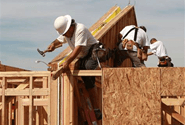Analysis

July 16, 2021
NAHB Seeks Help from Congress on More Affordable Housing
Written by David Schollaert
Testifying before Congress last week, National Association of Home Builders (NAHB) CEO Jerry Howard called on lawmakers to enact key policies that will ensure access to good housing for all Americans. During the subcommittee hearing, Howard noted that such policies will help home builders expand the housing supply, reduce the housing deficit and improve housing affordability.
“Over the past decade, the residential construction industry has underbuilt and not kept pace with demand due to several supply-side constraints,” said Howard. “These include a lack of skilled labor and buildable lots, tight lending conditions, shortages and rapidly rising prices for building materials, and excessive regulatory burdens that have added approximately 25% to the cost of a single-family home and 33% to a multifamily unit. Progress must be made on all fronts to ease the supply-side challenges that are holding back housing production.”
With the persistent lack of housing stock representing the most significant challenge for prospective home buyers, Howard called on Congress and the Biden administration to fix the building materials supply chain, improve the Low-Income Housing Tax Credit, and reformulate current homeownership tax incentives.
A new softwood lumber agreement with Canada is needed to stop the imposition of harmful tariffs on Canadian lumber that are escalating material costs and creating price volatility, maintains NAHB. “Commerce Secretary Gina Raimondo has committed to holding a summit of industry stakeholders to examine supply chain issues for lumber and other materials and to explore policy solutions. We look forward to participating in that process,” said Howard.
Additionally, improving the Low-Income Housing Tax Credit by enacting the Affordable Housing Credit Improvement Act would help finance more than two million additional multifamily units over the next decade. The bill would increase the amount of credits allocated to each state and expand the number of affordable housing projects that can be built using private activity bonds,the association said.
Lastly, NAHB noted that tax changes have undermined the effectiveness of the mortgage interest deduction, resulting in fewer middle-class taxpayers itemizing their taxes, with incentives flowing more to high-income households. NAHB argues that a shift away from the mortgage interest deduction to a permanent homeownership tax credit that is targeted to lower- and middle-income Americans would make homeownership more accessible to the general population.
“A permanent, first-time home buyer tax credit would complement this shift and could provide some relief to the challenge of accumulating a down payment,” Howard said.






